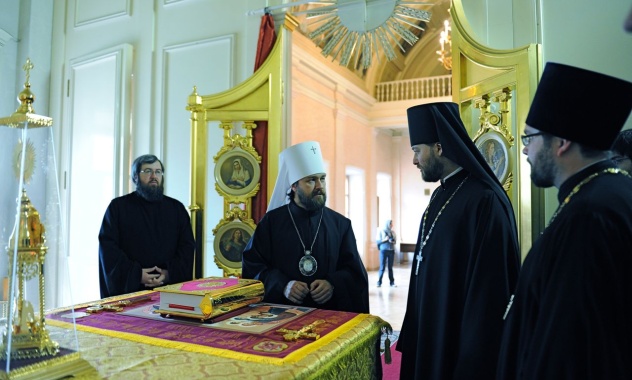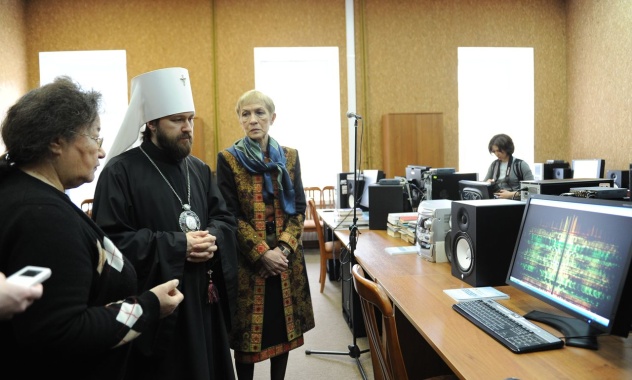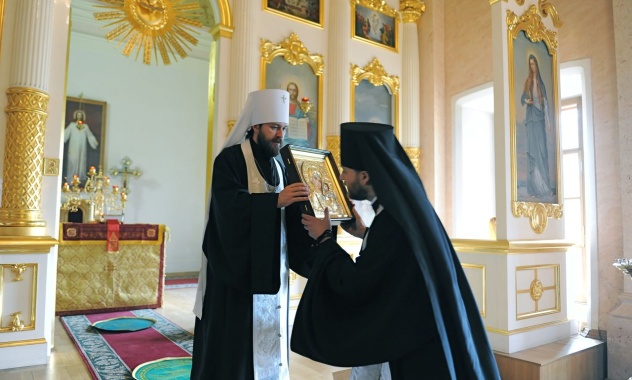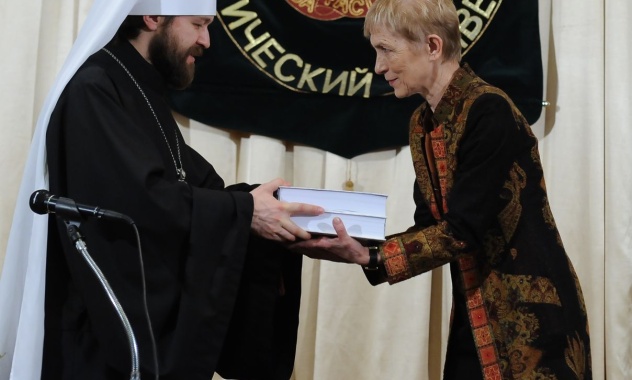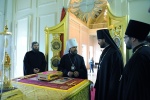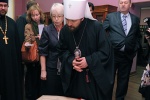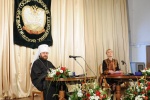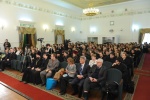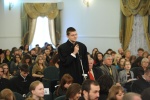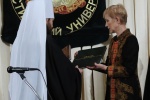Metropolitan Hilarion of Volokolamsk visits Moscow Linguistic University
On 22 April 2010, Metropolitan Hilarion of Volokolamsk, Chairman of the Moscow Patriarchate’s Department for External Church Relations and Rector of the Church Postgraduate and Doctoral School visited the Moscow State Linguistic University (MSLU). An agreement on cooperation between the Church Postgraduate and Doctoral School and the Moscow State Linguistic University was signed during the visit.
The archpastor was greeted by the MSLU rector, doctor of pedagogical sciences, professor and academician of the Russian Academy of Education I. Khaleyeva; rector of the house church of St. Mary Magdalene Equal-to-the-Apostles and student of the Church Postgraduate and Doctoral School hegumen Timofei (Podobedov), and faculty and students of the University.
Rector Khaleyeva showed Metropolitan Hilarion the MSLU training facility, including the Institute of Applied and Mathematical Linguistics, library, Institute of International Relations and Socio-Political Sciences; Situational Centre, and Centre of Ethnogenesis. The teachers told Metropolitan Hilarion about new publications of the University.
Metropolitan Hilarion had a talk with the faculty of the Chair of theology and the Chair of linguistics and professional communications in theology. The Chair of theology was opened at the MSLU Department of German language eight years ago. Head of the Chair of German language G. Voronina informed of the third class of graduates. Head of the Chair of theology I.Kharuk introduced the faculty, several Orthodox clerics among them.
Metropolitan Hilarion and hegumen Timofei celebrated Litia at the University house church for the undergraduates of the Department of translation Yelena Agoshkova and Vladimir Petrenkov who dies at the terrorist attack in the Moscow Metro on March 29. Their parents prayed together with the faculty and students. After the Litia, Metropolitan Hilarion addressed all of them with the words of consolation:
“A sudden end of human life is always tragic. A sudden death of young people who could have lived a long life, could have done many good things and could have given life to their descendants is even more tragic. This is tragedy for their relatives and for their fellow students and workers, but this a tragedy by human standards, as there is a mysterious Divine Providence that guides people and leads them to the Heavenly Kingdom, bringing good results even from evil doings of other people.
“All people are created to live on earth, but first and foremost for eternal life. That what can be perceived as a tragedy or a chance, is justified in the life of every human person by the Divine Providence and the Divine love. There is no man whom God does not love. There is no man whom God forgets or neglects.
“A tragedy in human life or its premature end does not mean that God has not foreseen a better destiny for this man. This means that God has not judged him to experience trials and hardships in his earthly life, but has moved him to heavenly life.
” Any time when our near and dear die or perish, we should pray for them. We should pray to the Lord to forgive them all their sins, all human feebleness and weakness, to forgive anything that prevents them entering the Heavenly Kingdom and be united with God. We should think about the meaning of our own life. We should remember that our life could end as suddenly as Vladimir’s and Yelena’s life. This means that we should live every day of our life to be able to give account to God for it.
“We should not lead an aimless life, we should not wait for the day or the year to pass, but we should prepare ourselves to eternal life. We should not be ashamed of our life. We should hasten to do good. A day on which we do nothing good will be erased from our life. Also erased could be a day on which we do something bad but do not repent, cry out to God and promise not to repeat our evil doings. The life of a man who did evil will be erased from the Divine book of life and from human history. Therefore, when we pray for those whom we had lost, we should pray for ourselves, too. WE should pray for our life to be worthy and for our readiness to stand before God and the judgment of God’s love.
“Memory eternal to the late-lamented Yelena and Vladimir. Dar brothers and sisters, faculty and students of the University, I wish you to remember the main thing: parallel to our temporary world with its earthly vanity there exists the eternal world with no vanity, but with eternal blessedness and eternal joy with God. Near to our world with its sickness, sorrows, sufferings, and death, there exists the world without death, sickness, sufferings, signing, or sorrow. St. John the Theologian said that the Lord would wipe away every tear from human eyes in that world in which there is neither death, nor sorrow, nor sickness, as the Lord reigns there with His chosen people.
“Christ is risen!”
Metropolitan Hilarion presented the University church with a Kazan Icon of the Mother of God.
The Rector of the Church Postgraduate and Doctoral School read a lecture on the meaning of language to the MSLU faculty and students and answered their questions.
After the signing of the agreement on cooperation between the educational institutions, the archpastor was presented with flowers and a commemorative token of the MSLU, as well as books published by the University. The DECR Chairman presented Ms. Khaleyeva with the book “Orthodoxy” in two volumes which he wrote.
Metropolitan Hilarion was accompanied by the DECR secretary for far abroad countries the Revd. Sergiy Zvonarev, head of the DECR Language service the Revd. Arseniy Chernikin, executive assistant to the DECR chairman hierodeacon Ioann (Kopeikin), secretary of the Academic Board of the Church Postgraduate School A. Mramornov, and a DECR staff member M. Palasio.








